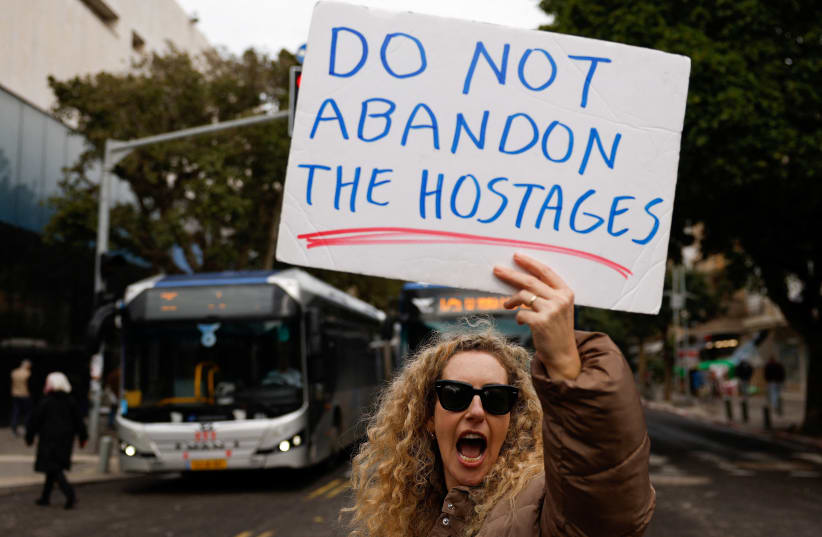Over half (51%) of center-right and right-wing voters support the signing of a deal to release the hostages being held by Hamas, even at the risk of disbanding the coalition and going to elections, according to a poll published by the Berl Katznelson Foundation and the Midgam company on Wednesday.
Overall, 66% of the Israeli public supports signing a hostage deal, even if it leads to elections.
Additionally, 57% of Israelis believe Prime Minister Benjamin Netanyahu's conduct is delaying efforts to reach a hostage deal, with 38% of center-right and right-wing voters holding the same view. In contrast, another 38% of center-right and right-wing voters believe that Netanyah's conduct is helping, not harming, efforts to reach a hostage deal.
The poll also found that 64% of Israelis think that for the last decade, governments have pushed off dealing with the conflict with the Palestinians.
Additionally, 70% of Israelis believe that the government has pushed off dealing with Hezbollah.
A vast majority of the Israeli public believes that making decisions concerning the conflict with Hezbollah (89%) and concerning the conflict with the Palestinians (88%) is necessary to preserve the future of the country.
44% of Israelis support a Palestinian state in exchange for regional defense alliance
A possible proposal that would have Israel agree in principle to a Palestinian state in return for a regional defense alliance including Saudi Arabia, Egypt, Jordan, Bahrain, and the UAE also has relatively widespread support among Israelis, with 44% expressing support and 36% opposing it. Among centrists, 66% support the proposal, and 15% oppose it, while among right-wing voters, 35% support it, and 46% oppose it.
Meanwhile, 43% of Israelis support the establishment of a moderate Palestinian government under international supervision to replace Hamas, while 30% support having Israel take control and establish settlements.
Among center-right voters, 51% support the establishment of a moderate Palestinian government, while only 27% support direct Israeli control. Among right-wing voters, only 19% support the establishment of a moderate Palestinian government.
The vast majority (75%) of Israelis also feel that in the past decade, the State of Israel has mostly reacted to issues instead of actively trying to shape its future.
Seventy-one percent of the respondents said that a commitment by parties to make decisions on core issues that are on the agenda would impact how they vote in the next elections.
Israelis believe state pushing off important decisions
About 65% of Israelis believe that the state has pushed off making decisions on issues of religion and state, and about 60% believe that the government pushed off handling legal and democratic issues, such as the power the High Court of Justice has.
According to the poll, over half (57%) of respondents said that dealing with the state's relationship with the Haredi sector is necessary to ensure the state's future.
Additionally, 60% of Israelis are unsatisfied with the government's conduct regarding security and civil issues, with 43% of center-right and right-wing voters saying they are unsatisfied. Only 19% of right-wing voters said they were satisfied with the government's performance.
The poll also found that 61% of respondents believe that the government distributes resources unequally in favor of specific sectors, while only 27% of respondents said they think resources are equally distributed.
A large majority of Israelis (85%) said that they support greater investment by the state in health, education, and welfare services for citizens, even if it raises the cost of the budget.

